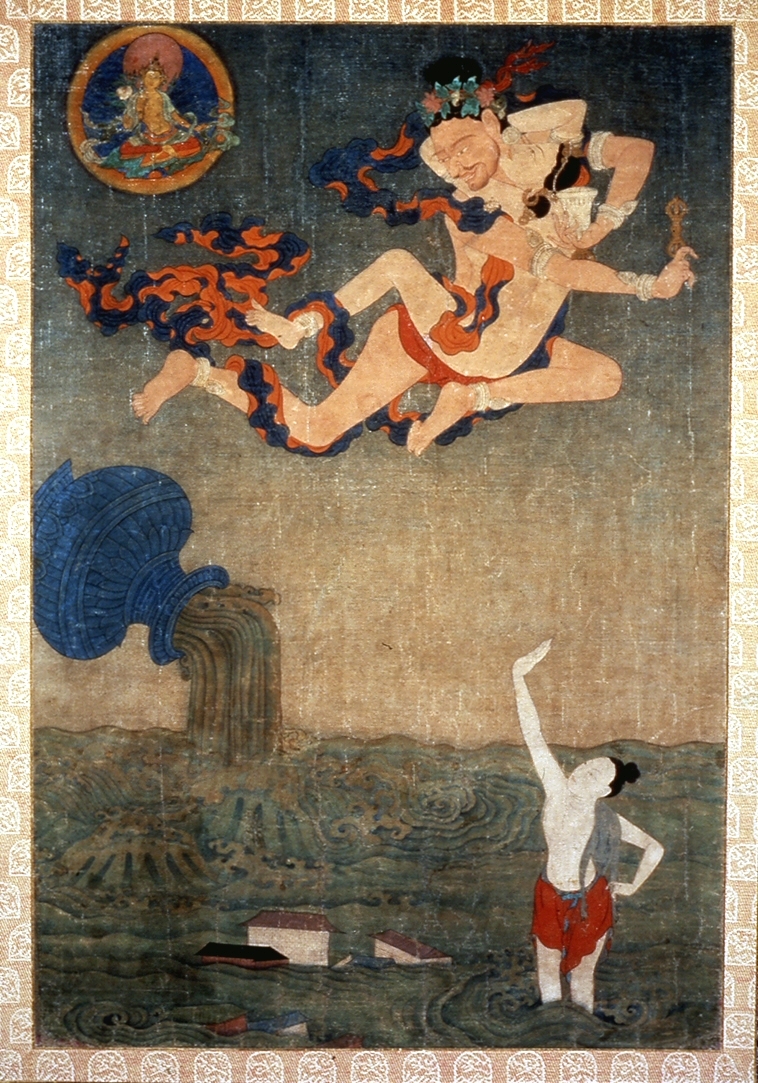Mahasiddha Ghantapa
June 10, 2012 0

Mahasiddha Ghantapa and the Great Flood, Anonymous (Tibetan), 18th century, pigments on cotton (Source: http://art.thewalters.org/viewwoa.aspx?id=13025)
From http://www.tsemrinpoche.com/tsem-tulku-rinpoche/buddhas-dharma/vajradhara-and-84-mahasiddhas.html
Gandrapa was a prince of Nalanda but renounced the throne to be a monk, and later, a yogin. In his travels he met the guru Darikapa and was initiated into the Samvara mandala. He then travelled to Pataliputra, where King Devapala, a pious man welcomed monks and yogins into his kingdom. The king however, had a troubled mind, he still felt he had not accumulated enough merit for his next rebirths despite being a devout man. When he heard of Ghantapa from his wife, the royal pair decided to invite the holy man as their priest, however, the envoy they sent returned bearing news that the yogin refused. The next day, the king went in person to the master, prostrating himself before Ghantapa, the king begged him to come to the palace, but Ghantapa refused again. Everyday, for 40 days the king returned to Ghantapa to repeat his invitation, and was refused everyday. Finally, the king’s pride was wounded and instead of pursuing their attempt to invite the yogin, he developed hatred for the holy man to the point they offered half of their kingdom to whoever was able to prove the yogin’s virtue and chastity as merely a sham.
Darima, out of greed, accepted the king’s challenge and set off to send her beautiful daughter to ensnare the monk. Much like the king, Darima visited the yogin everyday, prostrating to him for 9 days offering him nothing but devotion. On the 10th day, she begged him to allow her to be his patron during his summer monsoon retreat. Ghantapa refused, but Darima was persistent, returning again and again for a month. Finally, seeing no harm, Ghantapa agreed. When the rain came, the yogin retreated to a little hut Darima had constructed for him at the far edge of her property. Warily, the monk insisted only male servants bring him food, which Darima agreed. However, on the 15th day, she sent her daughter to the hut. Surprized, Ghantapa insisted the girl leave immediately, but it began to rain heavily, so the monk agreed to share his hut with the girl until the rain stopped. Unfortunately the rain continued until sunset, with the excuse of being afraid she would be mugged by thieves, the monk allowed her to sleep outside the hut. But during the night, she became frightened and began to beg for his protection. With a sigh of resignation, Ghantapa allowed her to come inside the hut.
The hut was very tiny. Inevitably, their bodies touched. Then their limbs intertwined. Before long, they had passed through the 4 levels of joy and traversed the path of liberation to its ultimate fulfillment. In 6 previous lives, this very girl was the cause of the monk’s downfall, but in this life, such defilement had long since dissolved, and he had gained the true path. In the morning, he asked the girl to remain with him and she agreed. They became yogin and consort, and because of her service to him for 6 lives, the defilements of Ghantapa’s consort’s mind were also purified. One year later, their child was born.
Darima never told any of this to the king, and finally at the 3rd year, when she thought the time was right, she informed the king. The king was overjoyed for the monk’s downfall and said he will visit the monk and the girl in 3 days time.
When they heard the news, the girl was very fearful. When Ghantapa asked if she wanted to stay and face them down, or leave Pataliputra, she begged him to flee with her, and he agreed. However, as they were leaving, they came face to face with the king and his followers. The king, looking down at the fleeing pair demanded answers for what he saw before him. The monk simply replied, “I’m carrying a jug of liquor, I have my son under my robe, and this is my consort.
When the king kept on repeating the accusations of what appeared to be Ghantapa’s fault, Ghantapa hurled both his son and the jug of liquor onto the ground. This so frightened the earth goddess that she trembled with fear. The ground gaped open and a geyser of water began to flood the entire space. The child was instantly transformed into a thunderbolt and the jug into a bell. Whereupon the yogin, bearing thunderbolt and bell, levitated with his consort into the sky, where they become the deities Samvara and Vajra Varahi joined in father-mother union.
The drowning people screamed, declaring they would take refuge in the master, but Ghantapa remained adamant in his Samadhi of immutable wrath. Suddenly, the Bodhisattva of Compassion appeared. Avalokitesvara placed his holy foot over the source of the flood and the water immediately flowed backward into the ground, and as if by magic, a stone image of the Bodhisattva appeared where his foot had trod. It remains there to this very day.
Everyone was saved. Prostrating themselves, they begged for forgiveness. Still hovering above the assemblage, Ghantapa said “Moral concepts practiced without understanding can be the greatest of obstacles to fulfilling the Bodhisattva’s vow of uncompromising compassion. Do not cultivate virtue and renounce vice. Rather, learn to accept all things as they arise. Penetrate the essence of each experience until you have achieved the one taste.”
At this, everyone was illuminated and their self-righteousness and petty prejudice vanished. Faith was born in the lotus of each heart. Ghantapa’s fame rang out to all the corners of the earth. Possessing the power and virtue of a Buddha, the yogin ascended into the Paradise of the Dakinis with his consort.
Arts, buddha, buddhism, Heruka, India, legend, mahasiddha, spirituality, story, Tibet, Vajrayogini Buddhas
Recent Posts
Subscribe to Blog
Categories
Archives
Visitors by Country
| Total Pageviews: | 1 |
|---|



Leave a Reply